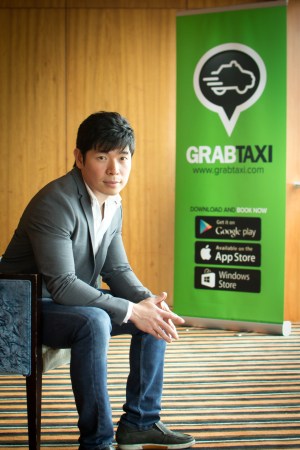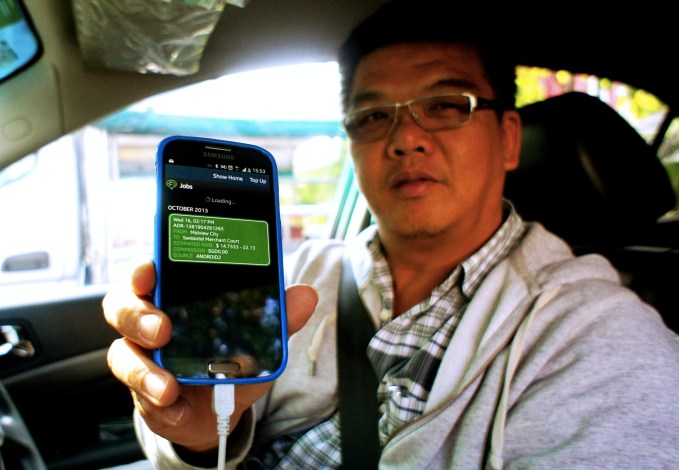SoftBank Invests $250M In GrabTaxi, Uber’s Archrival In Southeast Asia
Not content with
leading a $627 million mega-round for Snapdeal and
a $210 million raise for Ola as part of
a $10 billion commitment
to startups in India, Japanese telecom giant SoftBank has now turned
its attention to Southeast Asia and sunk $250 million into
GrabTaxi, Uber’s major rival in the region.
Neither party has confirmed what the deal values GrabTaxi at, but the
company’s valuation is likely to exceed the $1 billion mark. The
duo did confirm that SoftBank has become GrabTaxi’s largest investor.
The round is the highest raise for a startup in Southeast Asia to
date — Rocket Internet companies aside — and it is GrabTaxi’s fourth
funding activity this calendar year, taking it past $320 million in
capital from investors. GrabTaxi’s previous
$65 million round closed in October and was led by Tiger Global — which also invested in Uber rival Ola — while
GGV Capital led a $15 million raise in May.
Its $10 million-plus Series A was announced in April.
GrabTaxi was founded in Malaysia in 2012, has over 500 staff and is
live in 17 cities across six countries in Southeast Asia: Malaysia,
Philippines, Thailand, Singapore, Vietnam and Indonesia. Its core
offering is a service that connects registered taxis with would-be
passengers via its app — thus working with the existing industry rather
than against it — but it also offers an Uber-like private car service
and is trialling
motorbike taxis in Vietnam.
Uber is present in each of GrabTaxi’s markets, offering its standard
Uber Black service in all and its cheaper UberX service in most. Hailo
is present in Singapore, while Rocket Internet-backed Easy Taxi is a
minority player in a handful of countries in Southeast Asia.
Uber doesn’t break out user numbers, but GrabTaxi — which says it is
leading the taxi app space in Southeast Asia — claims 500,000 monthly
active users from 2.5 million app downloads. It says there are 60,000
drivers on its network, and that three bookings are made per second on
average across its platform — which is an 800 percent increase over the
past year.
Back in May, GrabTaxi claimed 1.2 million downloads and 250,000 monthly users.
Collecting War Chests
This Series D round comes at a fascinating time.
Uber raised $1.2 billion earlier this year and is tipped to be
closing in on another billion-dollar round
again soon at a rumored $40 billion valuation. GrabTaxi, it seems, is
building its own war chest, and bringing on a formidable ally in
SoftBank, at just the right moment.

GrabTaxi
didn’t explicitly reveal how it will invest the money from SoftBank,
but CEO and co-founder Anthony Tan told TechCrunch in an interview that
it will go towards fortifying its efforts in existing markets and
continuing its expansion across Southeast Asia.
There are no plans to move outside of the region, which has a cumulative population of around 600 million, he said.
“We’re going to be staying regional. [We want to] grow very fast and
focus on expanding in this region, whilst staying very very focused,”
Tan commented, speaking after the
Bloomberg ASEAN Business Summit in Bangkok, Thailand.
“We’ll also be hiring. We want the right kind of people, people who love people and believe in our mission,” he added.
Related to that, Tan said GrabTaxi is open to potential
acquisitions, but he stressed that in any possible deal, the focus would
be on finding the right cultural blend.
GrabTaxi has been focused on providing a pure-play transportation
service to date. Uber, however, has experimented with a range of
alternative services across the world. While he didn’t explicitly
advocate that GrabTaxi will follow suit, Tan did admit that the
company’s new funding intake gives it “the resources” to potentially
explore new areas of business in the future.
Price Battles
Harvard graduate Tan admitted that the price battles between rival
services in Southeast Asia necessitate significant funding just to
compete, although he said GrabTaxi still maintains the “heart of a
startup” — such as working hard, traveling via economy class
and low-cost carriers where possible — and generally being thrifty.
While Uber has raised boat loads of money for its operations, the
company is engaged in every continent on the planet. That’s something
that could mean GrabTaxi is actually better capitalized, which Cheryl
Goh, GrabTaxi’s VP of marketing, hinted.
“Our strong focus in this region means that each of [the] six
GrabTaxi markets stands to receive a significant portion of funding
compared to larger players that have to stretch their funding much
further,” Goh said in a statement without explicitly mentioning the ‘U’
word.
While SoftBank provided the entire round for GrabTaxi, TechCrunch
understands that the startup had multiple alternative offers on the
table. That certainly bodes well for the future, since GrabTaxi’s track
record and the ongoing battle will almost certainly require further
rounds of funding in the not-too-distant future.
Uber, GrabTaxi and others have
come under pressure from the governments
of Vietnam and Thailand this past week, and numerous other regulators
in the past. Tan didn’t provide specific comment on either of those
incidents, but he did reveal that GrabTaxi has set up a dedicated
government liaison team that works directly with authorities across
Southeast Asia to help smooth out issues and communications.
Southeast Asia’s startup scene continues to heat up. Just last week
Carousell raised $6 million and
PocketMath bagged $10 million.
But this investment from SoftBank is sure to put the region on the map,
particularly coming right after Rocket Internet’s Amazon rival
Lazada raised $250 million led by Singapore’s Temasek Holdings.

Making a Difference
When I put it to Tan that many founders will want to know how he’s
been so successful in Southeast Asia, he points to his faith in God and
his company’s mission to make a difference.
“There are a lot of well-run startups in Southeast Asia. We hope that
the values we’ve been pushing for — helping drivers make more money,
women feel safer and more — and changing the current ecosystem and how
we treat each other makes a difference,” he explained.
With SoftBank and its renowned founder Masayoshi Son on his side,
Tan’s company is closing out the year in a very different position to
how it began 2014. Then it was an outsider that was full of ambition and
plans but lacking resources. Now it has gathered steam in multiple
markets and pulled in the financial muscle to potentially battle Uber,
one of the world’s most talked-about companies, blow for blow.
Certainly, 2015 is gearing up to host a fascinating battle between
these two, particularly now that SoftBank has stepped into the ring.
Source: techcrunch.com by Jon Russell
Japanese group invests RM860mil in Internet company founded in Malaysia
KUALA LUMPUR: GrabTaxi Holdings Pte Ltd, whose roots can be traced back to Malaysia, received a major boost in its challenge to keep up with the market share fight in the taxi booking mobile application market with a US$250mil (RM864mil) investment from Japan’s Softbank Corp.
The investment, which was made through SoftBank Internet and Media, Inc (SIMI), is the largest for GrabTaxi, which is known as MyTeksi in Malaysia.
It is also among the largest, if not the largest, Internet company in South-East Asia.
The company that provides the mobile taxi booking application was founded by Anthony Tan and Hooi Ling Tan, both Harvard Business School graduates, in 2011, according to a statement from the company.
Anthony is the grandson of Tan Sri Tan Yuet Foh, the co-founder of the Tan Chong group of companies.
MyTeksi currently serves 17 cities across six countries in South-East Asia, including Malaysia, the Philippines, Thailand, Singapore, Vietnam and Indonesia.
Through the strategic investment and partnership with MyTeksi, the SoftBank group aims to further build its presence in South-East Asia and maximise synergies with its network of Internet companies around the world.
Nikesh Arora, the vice-chairman of SoftBank Corp and chief executive officer of SIMI, said in a statement that in two years MyTeksi had become the dominant player in South-East Asia’s taxi booking mobile app industry, which is a testament to Anthony’s outstanding leadership.
“We look forward to working with his team and supporting MyTeksi’s further expansion in the region,” he said.
SIMI will become the largest investor in GrabTaxi, Anthony told Bloomberg in an interview in Bangkok yesterday, without providing stake details.
GrabTaxi has raised about US$340mil (RM1.18bil) in the last 14 months, it said in a statement. GrabTaxi’s funding comes as rival Uber is said to be close to raising a round of financing that would give it a valuation of as much as US$40bil (RM138bil).
Ride-hailing apps on smartphones are gaining popularity across the world by providing transportation alternatives, with the investment by SoftBank adding to the 1,300 made by the Tokyo-based technology company.
“We will do whatever it takes to ensure that we maintain our leadership in an ethical and moral way,” Anthony was quoted by Bloomberg. “It’s a fight for market share. We’re many, many times bigger than our closest competitors and we intend to grow that fast.”
GrabTaxi counts Singapore’s Temasek Holdings Pte Ltd and Alibaba Group Holding Ltd backer GGV Capital among its investors.
There were now 500,000 active users who used the app at least once a month, up six-fold from a year earlier, GrabTaxi said. It received about three taxi bookings every second across the region, the company said.
SoftBank, founded by Masayoshi Son in 1981, controls wireless carriers in Japan and the United States, as well as owning the largest stake in Alibaba Group Holding.
In October, the unit of SoftBank said it would lead an investment of US$210mil (RM726mil) in ANI Technologies Pvt, which offers a taxi booking service called Ola Cabs in India.
Uber has been attempting to gain a foothold in the region despite multiple regulatory tangles and already fierce competition.
Within South-East Asia, Uber is said to operate in the same six markets as GrabTaxi, after entering Singapore last year. It does not release operational statistics.
Malaysian and Indonesian authorities have said Uber services that utilise private vehicles are illegal, while Thai authorities last week indicated that they are also banning the service.
Other major taxi apps in South-East Asia include Indonesia’s Blue Bird, regional player EasyTaxi, backed by German start-up incubator Rocket Internet, as well as London-based Hailo, which operates in Singapore.
Taxi-hailing apps have become popular in South-East Asia, especially Singapore, one of the most expensive places in the world to own a private car.
Finding a cab during peak hours and during frequent tropical downpours can be difficult in the city-state, which last month said it planned to start regulating third-party taxi booking services for the first time.
Heavy traffic in cities such as Manila and Jakarta also makes finding taxis tough.
Those troubles are benefiting apps such as GrabTaxi. The apps are seen as revolutionising the taxi industry, which has long been plagued by inefficient cartels and price-gouging drivers.
Source: The Star/Asia News Network
Related posts:
 Perseverance pays: Grove says he learnt the value of persistence when the bursting of the dotcom bubble drastically altered the company’s fortunes in 1999.
Perseverance pays: Grove says he learnt the value of persistence when the bursting of the dotcom bubble drastically altered the company’s fortunes in 1999.




















